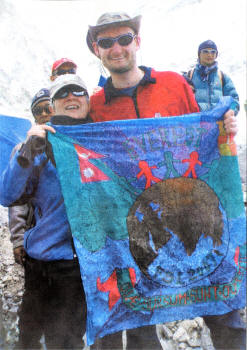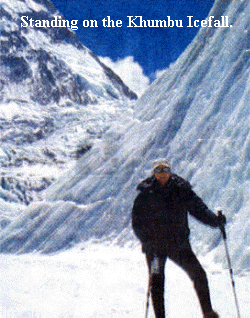
Marian hands a
Friends' School flag over to Roger. The
flag was designed by Alyson Clarke from
Year 8 with the motto 'Seek ye the
things that are above'. Roger took the
flag with him to place at the summit of
Everest.
LISBURN man Dr Roger McMorrow was truly on top of the world
this week when he phoned his wife to tell her he had conquered
Everest.
He reached the summit of the world's highest
peak at 4am local time on Thursday after his gruelling trek
where he has been working with the Caudwell Xtreme Everest team
who are using the journey to carry out medical research.
Lisburn man rings his wife to say he's conquered
Everest
The former Friends' School pupil made his
ascent from the south, via the South East Ridge Following his
arrival at the summit, Roger made a special call home to speak
to his wife Sara.
Describing his achievement she said, "I'm
delighted he made it and that he is safe. He phoned me at 4am
our time from the summit ridge. Once they reached the summit
there were high winds and I have since heard that they are at
the South Col which is the highest camp up there.
"He sounded really relieved. He was out of
breath, which is to be expected, but he sounded strong and
pleased and he knows when you're at the top you're only half way
there so he wasn't elated yet. He told me he was there and that
he loved me and was on his way home, I'm so delighted."
Roger isn't expected to arrive home until
June 12, however Sara is hoping she and their daughters Aoife,
who is a year and half and Isolde, three months, can see him
before that, "He can probably shave a week off, he has research
to finish, which I think has gone well, but we can't wait to see
him.
"His team were really strong, there were ten
in total and I think they all made it to the summit so I'm
delighted for all of them, but especially Roger." During the
treacherous climb he was confronted with temperatures down to
-40�C, high winds, storms and critically low oxygen levels.
Frostbite, exhaustion, hypothermia and high altitude illness
(mountain sickness )were ever-present and potentially fatal
risks.
During his climb Roger kept in touch with
loved ones via a web blog, in which he described his journey.
'Experience of a lifetime' on Everest for
teacher
 FRIENDS' school teacher Miss Marian Mateer has described a
journey she made to Everest in March as the 'experience of a
lifetime'.
FRIENDS' school teacher Miss Marian Mateer has described a
journey she made to Everest in March as the 'experience of a
lifetime'.
Miss Mateer spent 23-days on Everest, working
with Dr McMorrow as a volunteer with the the Caudwell Xtreme
Everest medical study.
She said, "I first heard about the trek last
June from Roger McMorrow and I set about trying to get myself as
fit as possible. To help keep me motivated I raised money for
two charities � Cancer
Research and Marie Curie, and got a total of
�4,300." Describing her journey she added: "Along our route we
were tested by teams of doctors/nurses who normally work in
Intensive Care Units. "The tests were looking at how we were
affected by low levels of oxygen as we gained altitude. The
results of these will ultimately help critically ill patients
who suffer from low oxygen levels."
She continued, "The trek to base camp took 10
days. The trekking itself was not too difficult but coping with
the altitude was. The scenery, however, was
stunning. 'Arriving at base camp was really exciting. It's a
desolate place but it was just teeming with people and activity.
We were tested once more and spent the rest of the time
exploring the Khumbu Icefall and taking photos."
Once there, however, she decided to go even
further as she explained: "I went with four others up an extra
300m to the top of Kala Pattar which afforded great views of
Everest. I would go back again tomorrow if possible."
Research on trip will benefit critically ill
patients
THE Caudwell Xtreme Everest team is a
research project co-ordinated by the Centre for Altitude, Space
and Extreme (CASE) environment medicine.
Their goal was to place a research team on
the summit of Mount Everest and make the first ever measurement
of the level of oxygen in human blood at this extreme altitude.
This research will be the centrepiece of an
extensive programme of research into hypoxia (low oxygen
levels), altitude illness and human performance at extreme
altitude.
Studying
The CASE team hope that the lessons learnt
from studying humans in life at the limits of survival can be
brought back to help in the care of critically ill children and
adults.
Dr McMorrow set up laboratories at Base Camp
(5300m), in the Western Cwm (6200m) and even carried out some
experiments on the South Col (7900m).
His team then made a few essential
measurements on the summit, before beginning the return journey.